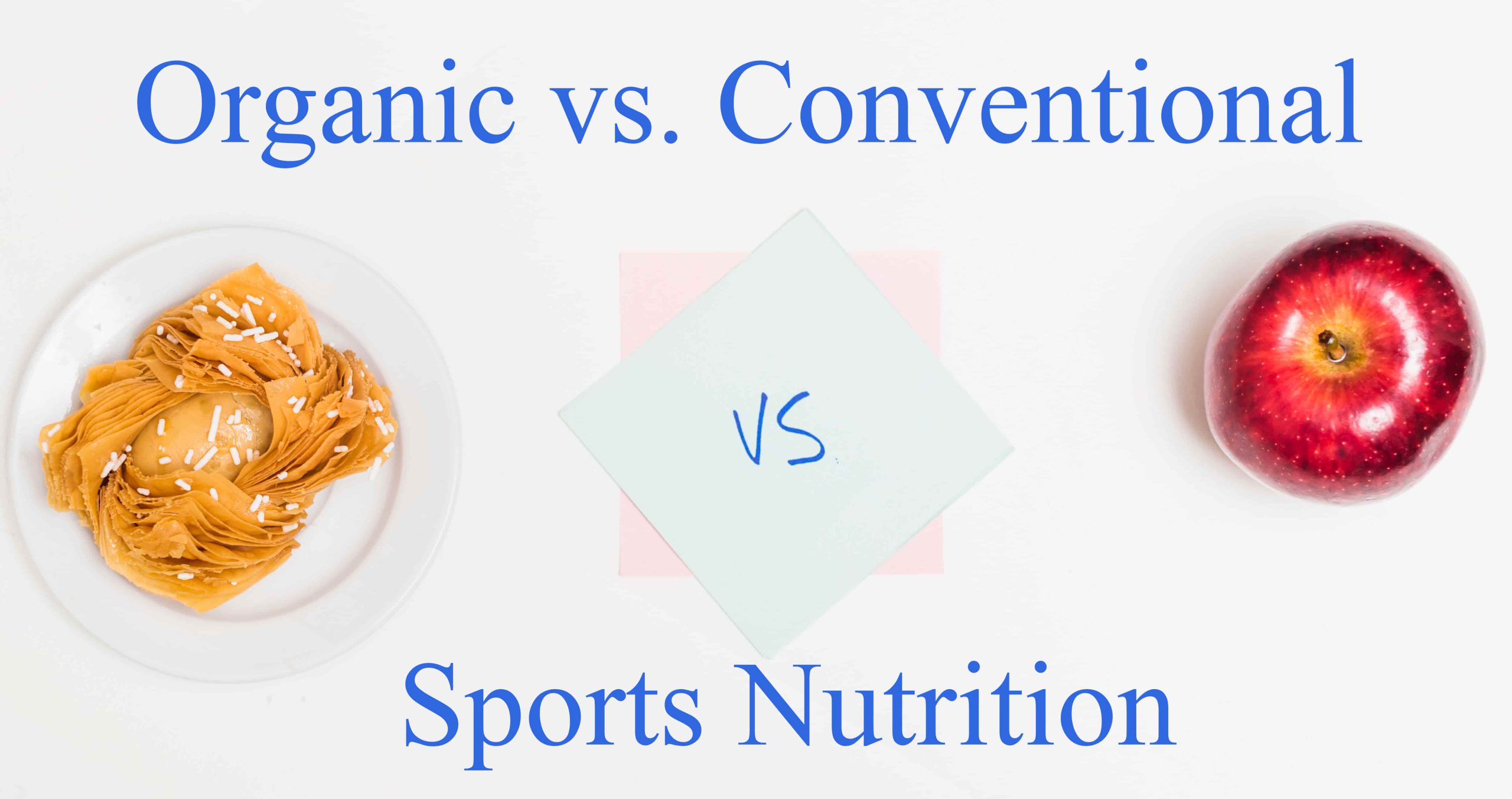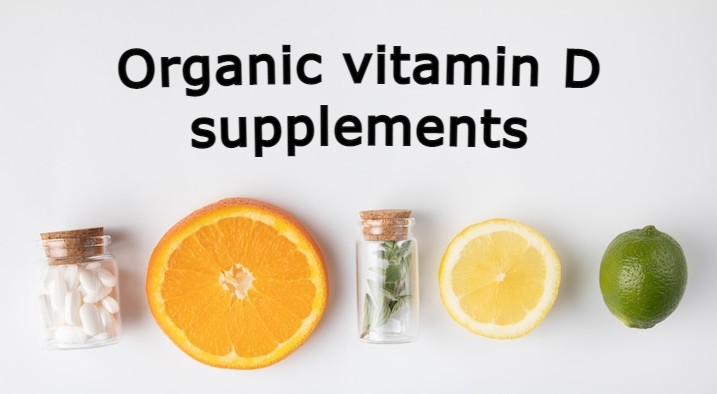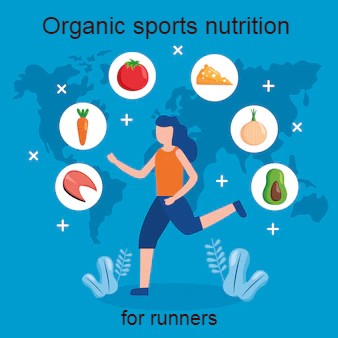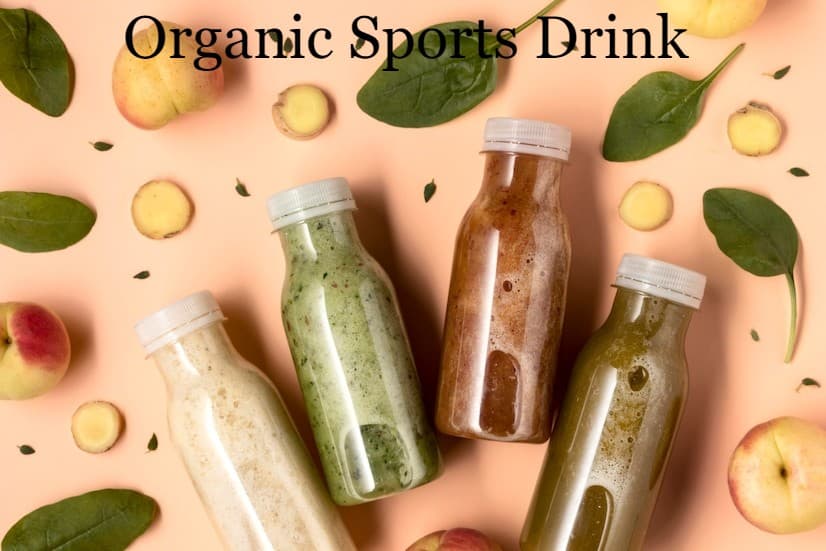Organic vs. Conventional Sports Nutrition

Organic vs. conventional foods has been a topic of debate for years, and it’s no different when it comes to sports nutrition. As an athlete, you want to fuel your body with the best possible nutrients to improve your performance and overall health. But with so many options available, it can be tough to decide which approach to take.
Choosing the right nutrition for athletes is crucial for achieving peak performance and maintaining overall health. Whether you’re a professional athlete or someone who enjoys exercising regularly, what you put in your body can have a significant impact on your ability to perform. Proper nutrition can help you improve your endurance, increase muscle mass, reduce inflammation, and speed up recovery time. On the other hand, a poor diet can lead to fatigue, injuries, and even illness. By fueling your body with the right nutrients, you can enhance your athletic abilities and feel your best.
That’s why it’s so important to understand the different approaches to sports nutrition and choose the one that works best for you. In this blog post, we’ll take a closer look at the benefits of choosing the right nutrition for athletes and explore the differences between organic and conventional sports nutrition.
| Fact | Organic Sports Nutrition | Conventional Sports Nutrition |
|---|---|---|
| Made from | Ingredients grown and processed without synthetic pesticides, fertilizers, or GMOs | Ingredients that may contain synthetic pesticides, fertilizers, or GMOs |
| Nutrient levels | May contain higher levels of certain nutrients, such as antioxidants | May contain added ingredients, such as caffeine and creatine, that can enhance athletic performance |
| Sustainability | More sustainable and better for the environment | May be less sustainable and have a larger environmental impact |
| Availability | May be less widely available | More widely available |
| Cost | Generally more expensive | Generally less expensive |
| Additives | May not contain artificial flavors, colors, or preservatives | May contain artificial flavors, colors, or preservatives that some athletes may want to avoid |
| Research | Limited research on the specific benefits for athletes | More research available on the benefits for athletes |
What is Organic Sports Nutrition?
Organic sports nutrition is a term that has gained a lot of attention in recent years as more and more people are recognizing the importance of healthy, natural foods in supporting athletic performance. In essence, organic sports nutrition is a way of nourishing your body with organic, nutrient-dense foods that are free from synthetic chemicals, genetically modified organisms (GMOs), and other harmful additives.
The focus of organic sports nutrition is on whole, unprocessed foods that are rich in nutrients and support the body’s natural functions. This means including plenty of fruits and vegetables, whole grains, lean proteins, and healthy fats in your diet. These foods provide a wide range of vitamins, minerals, and antioxidants that are essential for energy production, muscle recovery and repair, and overall health and wellbeing.

Definition of organic food and its production methods
Organic food is a term used to describe food that is produced without the use of synthetic pesticides, fertilizers, or other harmful chemicals. Organic farming methods focus on using natural practices to grow crops and raise livestock, with an emphasis on soil health, biodiversity, and sustainability.
Organic farmers use a variety of techniques to produce food without the use of synthetic chemicals. These methods may include crop rotation, cover cropping, and composting to maintain soil health and fertility. They also use natural pest control methods, such as planting companion crops and introducing beneficial insects to control pests.
In addition to avoiding the use of harmful chemicals, organic farming methods also prioritize sustainability and biodiversity.
According to research from Harvard.edu, organic farmers prioritize the creation of diverse ecosystems on their farms in order to support a range of beneficial insects, birds, and other wildlife. By doing so, they can improve soil health and reduce the risk of pest and disease outbreaks. This is achieved through practices such as crop rotation, companion planting, and the use of natural pest control methods. The result is a more sustainable and resilient farming system that benefits both the environment and the farmer.
Organic food production is highly regulated, with strict standards and certification processes in place to ensure that organic food meets specific criteria. For example, in the United States, organic food must be grown and processed without the use of synthetic pesticides, herbicides, and fertilizers, and must meet additional requirements related to animal welfare, soil health, and biodiversity.
Overall, the production of organic food is an important aspect of sustainable agriculture and supports the production of healthy, nutritious food without compromising the environment or human health. By choosing organic food, consumers can support these sustainable farming practices and contribute to a healthier, more sustainable food system.
Benefits of organic foods for athletes
As an athlete, it’s important to give your body the fuel it needs to perform at its best. While there are many different types of foods to choose from, organic foods are gaining popularity among athletes for their many health benefits.
One of the main benefits of organic foods for athletes is their high nutrient content. Organic farming practices prioritize soil health and biodiversity, which can lead to more nutrient-rich crops. This means that organic foods may contain higher levels of essential vitamins and minerals that are important for athletic performance, such as magnesium, potassium, and vitamin C. These nutrients can help to support muscle function, energy levels, and overall athletic performance.
Another benefit of organic foods for athletes is that they are often free from harmful chemicals and pesticides. Conventionally-grown foods are often treated with synthetic pesticides and herbicides that can be harmful to human health. By choosing organic foods, athletes can avoid these harmful chemicals and reduce their exposure to potential toxins. This can be especially important for athletes who are concerned about the impact of their diets on their health and want to make more natural and sustainable choices.
In addition, organic foods may also be more environmentally sustainable than conventionally-grown foods. Organic farming practices prioritize sustainability and biodiversity, which can help to reduce the environmental impact of agriculture. This can be especially important for athletes who are concerned about the impact of their diets on the environment and want to make more sustainable choices.
Overall, the benefits of organic foods for athletes are clear. From higher nutrient levels to reduced exposure to harmful chemicals and improved environmental sustainability, organic foods offer a range of benefits that can support athletic performance and overall health. If you’re an athlete looking to optimize your diet and support your body’s needs, consider incorporating more organic foods into your meals.

Examples of organic sports nutrition options
When it comes to organic sports nutrition options, there are plenty of choices to explore. From fresh fruits and vegetables to whole grains and lean proteins, athletes can enjoy a variety of organic foods that provide the necessary nutrients and energy to fuel their workouts and performance.
One great option for organic sports nutrition is organic fruits and vegetables. These foods are packed with essential vitamins, minerals, and antioxidants that help the body recover and maintain optimal health. Whether it’s a pre-workout snack like bananas or a post-workout meal with leafy greens and sweet potatoes, organic fruits and vegetables are a versatile and nutritious choice.
Whole grains are another excellent organic sports nutrition option. Whole grain products like brown rice, quinoa, and oats provide complex carbohydrates that release energy slowly, helping athletes sustain their performance throughout a workout or competition. These foods also contain fiber, which helps regulate digestion and promote overall health.
Finally, organic lean proteins are an important component of any athlete’s diet. Organic chicken, grass-fed beef, and wild-caught fish are all excellent sources of protein that can help repair and rebuild muscle tissue after intense exercise. Additionally, plant-based protein sources like beans, lentils, and tofu are also great options for athletes looking to incorporate more organic foods into their diet.
Conventional Sports Nutrition
Definition of conventional food and its production methods
Conventional food refers to the food produced using conventional farming practices, which involve the use of synthetic fertilizers, pesticides, herbicides, and other chemicals. The primary objective of conventional farming is to maximize yields and profits, and it often relies on intensive monoculture practices that can harm the environment and deplete soil health. Conventional food production also involves the use of genetically modified organisms (GMOs) to enhance crop yields and resistance to pests and diseases.
Benefits of conventional foods for athletes
Conventional foods are often cheaper and more readily available than organic foods, making them a more accessible option for athletes who need to consume large amounts of food to support their energy requirements. Conventional foods also tend to have a longer shelf life, making them a more practical choice for athletes who need to store food for longer periods. Additionally, conventional foods are often fortified with vitamins and minerals, making them a convenient way for athletes to meet their nutritional needs.
Examples of conventional sports nutrition options
Conventional sports nutrition options include energy bars, sports drinks, and protein powders. These products are often highly processed and contain artificial flavors, colors, and preservatives. While they may provide quick energy and nutrients for athletes, they may also contain high amounts of added sugars and other ingredients that can be detrimental to overall health. It is important for athletes to read labels carefully and choose products that are minimally processed and free from harmful additives.
Differences between Organic and Conventional Sports Nutrition

Nutrient density comparison
Nutrient density is a significant factor to consider when comparing organic and conventional sports nutrition. Organic foods are grown in nutrient-rich soil without the use of synthetic fertilizers and pesticides, resulting in higher levels of vitamins, minerals, and antioxidants. In contrast, conventional foods are often grown in soil depleted of nutrients and sprayed with chemicals, which can reduce their nutrient content. This makes organic sports nutrition a more optimal choice for athletes looking to maximize their nutrient intake and support their overall health and performance.
Pesticide and chemical exposure risks
Pesticide and chemical exposure risks are another important consideration. Conventional foods are often treated with synthetic pesticides and fertilizers that can leave harmful residues on the food. These chemicals can have negative effects on human health, including disrupting hormone function and increasing the risk of certain cancers. Organic foods, on the other hand, are grown without the use of synthetic chemicals, making them a safer option for athletes concerned about exposure to harmful substances.
Sustainability and environmental impact
Sustainability and environmental impact are also important factors to consider. Conventional agriculture practices often involve the use of synthetic fertilizers, pesticides, and herbicides, which can harm soil quality and contribute to environmental damage. Organic farming methods, on the other hand, prioritize sustainability and prioritize soil health and biodiversity, making organic sports nutrition a more environmentally conscious choice.
Cost comparison
Finally, cost comparison is an important consideration for athletes on a budget. Organic foods are typically more expensive than conventional foods due to the higher cost of production and certification. However, the long-term benefits of consuming organic sports nutrition may outweigh the initial cost, as it can contribute to improved health and performance in the long run. Athletes may also choose to prioritize organic options for certain high-risk foods, such as those known to contain higher levels of pesticides.
Studies and Research
Research on the benefits and drawbacks of organic and conventional foods
Studies and research play a crucial role in understanding the benefits and drawbacks of organic and conventional sports nutrition. Several studies have been conducted to compare the nutritional content of organic and conventional foods. One such study published in the Journal of Agricultural and Food Chemistry found that organic crops contain higher levels of antioxidants, vitamins, and minerals compared to conventionally grown crops. Additionally, another study published in the British Journal of Nutrition found that organic milk and meat contain higher levels of omega-3 fatty acids, which are important for athletes’ cardiovascular health and recovery.
Studies on the effects of pesticides and chemicals on athletes’ health and performance
Apart from nutrient content, several studies have also investigated the effects of pesticide and chemical exposure on athletes’ health and performance. A study published in the Journal of Occupational and Environmental Medicine found that pesticide exposure can lead to reduced lung function and increased risk of asthma, which can negatively affect athletes’ respiratory capacity. Additionally, research has shown that exposure to certain chemicals found in conventional foods can disrupt hormones and lead to impaired athletic performance and recovery.
Reviews of the sustainability and environmental impacts of organic and conventional farming methods
Finally, reviews of the sustainability and environmental impacts of organic and conventional farming methods have also been conducted. Organic farming methods prioritize soil health and biodiversity, while also reducing greenhouse gas emissions and protecting water quality. On the other hand, conventional farming methods often rely on synthetic fertilizers and pesticides, which can lead to soil degradation and water pollution. By choosing organic sports nutrition options, athletes can support sustainable farming practices and reduce their environmental footprint.
In conclusion, studies and research provide valuable insights into the benefits and drawbacks of both organic and conventional sports nutrition options. By considering the nutritional content, pesticide and chemical exposure risks, sustainability, and environmental impact, athletes can make informed decisions about which type of nutrition is best suited for their individual needs and goals.
Which is Better for Athletes?
Discussion of the pros and cons of organic and conventional approaches
When it comes to choosing the right sports nutrition for athletes, there are two main approaches: organic and conventional. Both have their pros and cons, and it’s important to consider a variety of factors when making a decision.
On the one hand, organic foods are grown without the use of synthetic pesticides or fertilizers, and they are not genetically modified. Organic farming practices also prioritize soil health and conservation of natural resources. As a result, organic foods may contain higher levels of certain nutrients and antioxidants, and they may also be less likely to contain harmful residues from pesticides and other chemicals.
On the other hand, conventional foods are often more widely available and less expensive than organic options. They may also be fortified with additional nutrients, such as iron or folic acid, which can be important for athletes. However, conventional farming practices can contribute to environmental pollution and degradation, and the use of pesticides and other chemicals can potentially have negative health effects.
When considering organic vs. conventional sports nutrition, it’s important to think about the specific needs and goals of the athlete. For example, if an athlete is concerned about minimizing their exposure to harmful chemicals, or if they have specific dietary restrictions (such as avoiding genetically modified foods), then organic options may be a better choice. On the other hand, if an athlete is on a tight budget or has limited access to organic options, conventional foods may be a more practical choice.
Ultimately, the decision between organic and conventional sports nutrition will depend on a variety of factors, including the athlete’s individual needs and preferences, as well as their budget and availability of different options. By considering the pros and cons of each approach and making informed decisions, athletes can optimize their nutrition to support their training and performance goals.

Conclusion
In conclusion, choosing between organic and conventional sports nutrition ultimately depends on various factors, including personal preferences, budget, accessibility, and environmental concerns. Both approaches have their pros and cons, and athletes should weigh them carefully before making a decision
Recap of the key points
Organic sports nutrition is food produced without synthetic fertilizers, pesticides, genetically modified organisms, or irradiation. Conventional sports nutrition refers to food grown using conventional farming methods that involve the use of synthetic fertilizers and pesticides.
Studies have shown that organic foods have higher nutrient density, lower pesticide residue, and lower environmental impact than conventional foods. However, they can be more expensive and less accessible than conventional foods.
Athletes should consider various factors, such as nutrient content, pesticide exposure risks, environmental impact, and cost, when choosing between organic and conventional sports nutrition. It is also essential to consult with a nutritionist or healthcare professional to determine individual needs and preferences.
Importance of making the right nutrition choices for athletes
As an athlete, your body requires proper nutrition to perform at its best. Choosing the right sports nutrition can have a significant impact on your athletic performance, recovery, and overall health. It is crucial to make informed decisions when it comes to food choices, especially if you want to achieve your fitness goals and maintain optimal health.
Final thoughts and recommendations
In conclusion, both organic and conventional sports nutrition can be beneficial for athletes, depending on individual needs and preferences. While organic foods may have some advantages, they may not be practical or affordable for everyone. Therefore, it is essential to find a balance that works for you and your budget while prioritizing nutrient-dense, minimally processed foods.
Incorporating a variety of whole foods into your diet, whether they are organic or conventional, can help ensure that you are getting the necessary nutrients to fuel your body and optimize athletic performance. Consulting with a nutritionist or healthcare professional can also provide valuable insights and guidance on making informed food choices.
FAQ:
There is limited research on the specific benefits of organic sports nutrition for athletic performance. However, organic foods and supplements may contain higher levels of certain nutrients, such as antioxidants, which can help reduce inflammation and improve recovery.
Yes, organic sports nutrition can be more expensive than conventional sports nutrition due to the higher cost of producing organic ingredients.
Conventional sports nutrition may contain synthetic additives, such as artificial flavors, colors, and preservatives, that some athletes may want to avoid. Additionally, some conventional ingredients may be produced using synthetic pesticides, fertilizers, or genetically modified organisms (GMOs), which some athletes may be concerned about.
Athletes can get all the nutrients they need from a balanced diet that includes organic or conventional foods. The choice between organic and conventional sports nutrition depends on individual preferences and priorities.
Table of contents
Read more:



